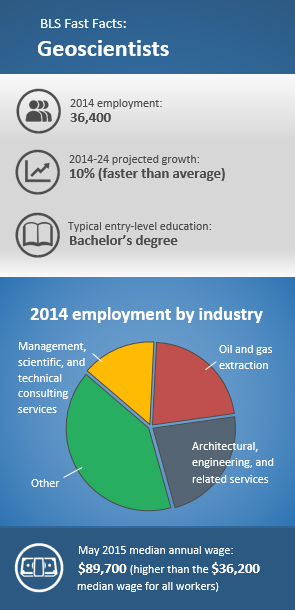All Categories
Featured
Table of Contents
Geology Careers: Degree Requirements, Cost & Salary in Ascot WA 2020

Other possible geophysicist majors that aren't geophysics or geoscience include: Atmospheric sciences and meteorology Chemical and physical oceanography Earth science Environmental science Hydrology and water resources science Materials science By earning any geophysicist degree, and by taking the essential geology courses, you must get approved for an entry-level position as a geoscientist or geophysicist.
Ultimately, trainees should find out: a branch of geology that looks at the various aspects of minerals, including chemical structure, internal crystal structure, and physical properties. the research study of rocks and the procedures and conditions that form and change them in time. There are a couple of subdivisions in this branch of geology, including igneous, metamorphic, and sedimentary rocks.

This field analyzes structural rock features such as cleavage, faults, joints, and little folds. They must also learn the computer abilities required to: examine information produce digital designs and maps operate geoscientists' software Students need to also take benefit of all opportunities to gain real-world experience. Ambitious geophysicists should anticipate to hang around knowing: in the class in the field in laboratories Undoubtedly, abilities taught in the class are really essential for striving geophysicists.
Geophysicist in The Vines WA 2021
Geoscientists spend a lot of their time outside when working in the field, so they should possess "outdoor abilities" like camping and running boats, airplane, and other lorries. Because they invest a lot time in remote areas, it's essential that geophysicists likewise have the physical stamina to carry needed equipment on their hikes to areas of research study.
The task uses: a high typical and leading incomes a high rate of individual complete satisfaction amongst geophysicists low work stress positive task outlook Additional details on revenues capacity and job outlook is detailed listed below. For students aiming to land an entry-level role as a geoscientist or geophysicist, it takes four years, or the time needed to complete a bachelor's degree in geophysics or a related discipline.
Some research study positions in geophysics need postgraduate degrees. Also, if you plan to teach at a college or university, you should make a Ph - Career Guide: Geophysicist in Osborne Park Aus 2023. D. in geophysics or an associated field. The time it takes to make a Ph. D. differs by organization and program, but it generally takes four to six years beyond the bachelor's degree.
Geophysics Jobs in Como WA 2023
Many employers require candidates to have a bachelor's degree in geophysics or a closely associated discipline for all entry-level positions. As a result, there's no way around the degree requirements for becoming a geophysicist.
Presently, 31 states need licensing for geologists, although licensing is not constantly required, especially for entry-level work. The states that do concern licenses utilize the Principles of Geology Exam (FGE), which is administered through the National Association of State Boards of Geology (ASBOG). Now that you understand which degree for geophysicist tasks you need, you'll need to land a task, and it is very important to discover just how much cash you can make in this profession.
According to BLS, the mean annual wage for geoscientists is $93,580. The most affordable 10% of earners make less than $52,000, while the highest 10% earn more than $201,000 every year. Incomes change by industry type and geographic location. According to BLS, particular markets use higher incomes for geoscientists, and in many cases, they provide higher-than-average earnings.
Geophysical Survey in Spearwood Aus 2021
Mining, quarrying, and oil and gas extraction offers over $32,000 more each year than the typical yearly wage for this profession. The federal government, too, provides over $10,000 more in incomes than the nationwide average for geoscientists. In addition to market type, geographic location can greatly impact incomes for this profession.

The top-paying states and their yearly mean salaries, according to the BLS, consist of: Texas $166,720 Oklahoma $149,630 Pennsylvania $120,590 Hawaii $120,130 Colorado $107,260 These 5 top-paying states offer much higher incomes than the average for this profession. In reality, incomes for geoscientists in Texas are over $73,000 greater than the nationwide average.
It needs to come as not a surprise that the majority of these high-paying areas are in Texas and Oklahoma, however some are found in California, Louisiana, and Colorado. The leading 10 highest-paying metro locations for geoscientists are: Houston-The Woodlands-Sugar Land, Texas: $188,400 Tulsa, Oklahoma: $186,490 Midland, Texas: $167,040 Odessa, Texas: $147,080 Oklahoma City, Oklahoma: $145,350 Bakersfield, California: $130,080 Urban Honolulu, Hawaii: $124,470 New Orleans-Metairie, Louisiana: $121,030 Washington-Arlington-Alexandria, DC, VA, MD, WV: $120,180 Denver-Aurora-Lakewood, Colorado: $116,910 For some geoscientists and geophysicists, living in a metro city is not as enticing as residing in a smaller sized community.
Table of Contents
Latest Posts
How To Become A Geophysicist in Mount Claremont Oz 2023
Geophysical Survey Next Step In Carbon Storage Study in Brookdale Western Australia 2023
Geophysical Investigations in Calista Western Australia 2022
More
Latest Posts
How To Become A Geophysicist in Mount Claremont Oz 2023
Geophysical Survey Next Step In Carbon Storage Study in Brookdale Western Australia 2023
Geophysical Investigations in Calista Western Australia 2022